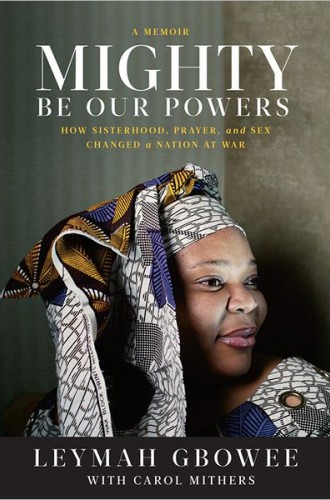Mighty Be Our Powers, by Leymah Gbowee
Leymah Gbowee's tranquil, relatively privileged life as a 17-year-old university student exploded in 1990 when war broke out in her homeland, the West African nation of Liberia. Today she is a spokesperson for women worldwide who are tired of war and want to build peace. Her memoir Mighty Be Our Powers tells the gripping story of the 21 intervening years. If you are looking for hope among the many news stories of conflict and violence, you will find it here.
And, if you are looking for an original, passionate memoir, you will find that too in this book. Listen to Gbowee describe her immersion into war after a childhood of peace: "When you move so quickly from innocence to a world of fear, pain and loss, it's as if the flesh of your heart and mind gets cut away, piece by piece, like slices taken off a ham. Finally, there is nothing left but the bone."
Read our latest issue or browse back issues.
In 1996, six years after Charles Taylor began the rebellion that toppled the government of Samuel Doe and led to multiple struggles for power among warlords, Liberia lay in ruins. All the infrastructure—roads, hospitals, schools, electricity—was gone. Soldiers had shot up anything left standing, including light poles. More than 80 percent of the population was living below the poverty line. Little boys were toting AK-47s that they could hardly lift but knew how to shoot.
During this time, Gbowee was forced to survive any way she could. She accepted protection from a man who fathered her children but also beat her. The reader comes to trust the narrator as she goes from young bright star, to survivor, to abused woman, to mother and protector of many children, to peacemaker, to activist, to spokeswoman for all women and an international traveler, speaker and award winner.
The division of the book into three sections follows the classic three-act story structure, with the middle act slightly longer than the other two. This is a memoir that reads like a novel; it is built on the classic rhythm of introduction, call and response, and conclusion.
The climax of the story takes place in the second act. Gbowee was part of a group called the Women in Peacebuilding Network, and she was so devoted to its cause that she sometimes took her blanket and pillow and slept in the office overnight. One night she had a vivid, disturbing dream without images but with a clear voice speaking to her in the darkness: "Gather the women to pray for peace!" At 5 a.m., when she awoke, Gbowee was shaking. Her first thought was of the unworthiness she felt.
Women in Ireland and in Bosnia had previously banded together across warring lines to work for peace, but this kind of peace movement had never sprung up in Liberia before. As Gbowee began to act on the vision she had been given, her diffidence began to fall away and her confidence increased. In April 2002, about 20 Lutheran women gathered and began to form the Christian Women's Peace Initiative. The rest of the book tells the story of how the small initiative grew into a Christian-Muslim national movement and of how women demanded and eventually wrested peace from male leaders.
Gbowee's memoir can be read as a classical spiritual journey. At first the disruptive forces of war cause Gbowee to lose her untested faith. Later she finds great strength in prayer, in hymn singing and in the promise of Isaiah 54:11, a verse she returns to over and over again: "I will lay thy foundations with sapphires." She also supports her Muslim sisters in their faith practices.
The image of Jesus as Prince of Peace and as revolutionary peacemaker gives Gbowee strength as she joins other women in confronting the powers and principalities in a prolonged and costly war. At one point in the battle for peace, women wearing white begin to appear in a field near a fish market where Gbowee had played soccer as a child. As the women appear, she finds the words they need to hear: "In the past, we were silent, . . . but after being killed, raped, dehumanized and infected with diseases, and watching our children and families destroyed, war has taught us that the future lies in saying no to violence and yes to peace! We will not relent until peace prevails!"
The story that follows, wherein the women face their own potential divisions and overcome both internal and external threats, is as thrilling as any come-from-behind victory story. It is not surprising that the story became a prize-winning film, Pray the Devil Back to Hell, produced by Abigail Disney in 2008. This fall Women, War and Peace, a new series that includes Gbowee's story (and is also coproduced by Disney), will premiere on PBS.
Today Liberia is slowly recovering from protracted warfare, having elected Ellen Johnson Sirleaf in 2006 as its first woman president, an outcome unimaginable two decades ago. Sirleaf, the only female head of state in Africa, benefited from the way her Liberian sisters stood up to both Charles Taylor and the rebels and sang and prayed their way to peace.
One of the reasons this memoir grips the reader is that the voice is so honest. Gbowee turned down multiple invitations to take political positions or prestigious jobs. She tells us how she slipped into alcohol dependency and then conquered it, and she explains why she feels shame for staying with an abusive man and continuing to have his children even though she didn't love him.
Gbowee states in the conclusion that one of her desires is to run for parliament in Liberia. This book could be for her what Dreams from My Father was for Barack Obama—an introduction to her soul.






